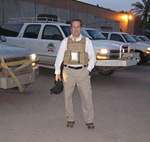USIP's Iraq program aims to reduce interethnic and interreligious violence, speed up stabilization and democratization, and reduce the need for a U.S. presence in Iraq. As part of this program, USIP has maintained a small office in the Green Zone in Baghdad since early 2004. Rusty Barber, a former political officer in the Foreign Service, has run the office since March 2007. His regular dispatches offer a lively and sobering insider's view of the promise and peril facing U.S. efforts in that country. We'll update this section each week, making only minimal changes for security reasons.
The surge continues apace with, at best, uneven results so far. I spoke to a young soldier the other day, relaxing on top of his Humvee after returning from patrols in the Doura section of southeast Baghdad. He commented that the area—which has seen a significant amount of insurgent activity—is showing signs of calming down, with residents beginning to respond positively to the increased patrols. "It's still pretty hot down there, though," he allowed, ruefully suggesting that I "drop in" sometime.
Image on left: Rusty prepares to leave IZ (Green Zone)
 Tomorrow I will make my first foray beyond the walls of the IZ into Baghdad proper to observe one of our more important conflict management training events. This is not a trip I intend to make often, but I feel it is necessary under certain conditions to credibly understand, represent, and advance the goals of USIP's peacebuilding mission in Iraq.
Tomorrow I will make my first foray beyond the walls of the IZ into Baghdad proper to observe one of our more important conflict management training events. This is not a trip I intend to make often, but I feel it is necessary under certain conditions to credibly understand, represent, and advance the goals of USIP's peacebuilding mission in Iraq.



